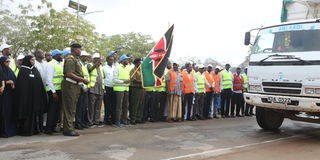Governors in northeastern should declare drought regional disaster

Mandera Governor Mohamed Adan Khalif (holding the flag) on November 2, 2022. He flagged off relief food targeting 60,000 households affected by drought in Mandera.
The northeastern Kenya counties of Wajir, Mandera and Garissa have not conceptualised and understood the 2010 Constitution of Kenya insofar as devolution is concerned, more than 10 years later.
In principle terms, devolution means the transfer of power and funding from the centre to the periphery. In the Kenyan case, the periphery is the county. This ensures decisions are made by or closer to the communities with the main focus being on priority areas.
The Constitution divides Kenya into 47 counties with their respective county headquarters but up in the North, county leaders are still stuck in the old ways of doing things.
They are nostalgic about the old constitutional order where the centre of power was Nairobi; where all the national government ministries, departments and agencies in the district regularly visited the capital for consultations on policy, budgetary, operational, strategic plans and other day-to-day management matters.
It’s unfortunate that 10 years after devolution, the NE county leaders permanently reside and operate from Nairobi, unlike other counties where governors operate from their counties.
Frequent trips
NE governors and their cabinets are a common feature at Wilson Airport. They frequently fly out in the morning, hop into their counties and fly back to Nairobi the same day once a week or fortnight.
Imagine the amount of public money spent in travel, housing, shopping and hotel meetings! These funds could have improved the local economy.
Operating from a county gives leaders a better understanding of the needs of the people and better ways of addressing them.
With the powers conferred on them by the Constitution, the NE county leaders should have declared the ongoing drought as a disaster. This is because the drought has killed the economic base of NE, which is livestock, and is threatening human life.
Such a declaration would have allowed the usage of all county resources except staff salaries for food and water distribution to starving people and livestock. That is the essence of devolution.
Ordinarily, only after exhausting their budgets would the governors turn to the national government and international Agencies for help.
Strategic thinking
These challenges require strategic thinking.
In order to spur economic development in their areas, the county leadership should create sub-county treasuries. These would help procure and make payments for all the projects implemented at the sub-county level, besides coordinating county programmes and projects.
Before devolution, we had district treasuries, which flourished in terms of business. I once visited the then Habaswein District and was excited at what I saw. The place had modern buildings for hotels, guests and residential houses. Habaswein also had a bank, a sign that a lot of money was in circulation. It was the same case in Giriftu and Bute in the larger Wajir District.
For devolution to have meaning to the people of NE, governors will have to stop “exporting” seminars and workshops to other counties.
The governors must conduct their workshops or seminars in their county headquarters or even sub-county headquarters. Conducting such events outside NEP is expensive. With more than Sh40 billion budgets in the 2022/2023 financial year, NEP counties can overcome famine and bring the need social- economic development in the region.
But for this to be achieved, professionals from the region, including religious, political and opinion leaders must abandon their comfort zones and take the lead in shaping the social economic development in the area.
There is no denying the fact that the region has lost a big opportunity in the first decade of devolution despite having received more than Sh350 billion in counties’ equitable shareable revenue and support from multi-lateral agencies.
As professionals, we have an opportunity to redirect the energy and focus in this second decade. We should not allow our communities to die of poverty, ignorance and diseases as we look up into the second decade, which is projected to inject about Sh500 billion in the three counties.
Mr Sheikh is a governance and development consultant. [email protected].




